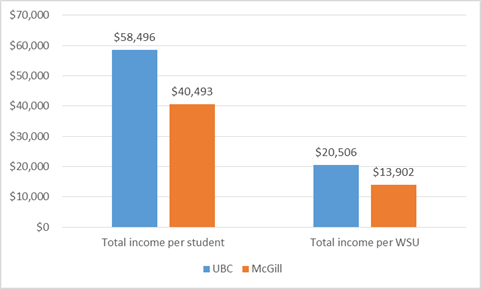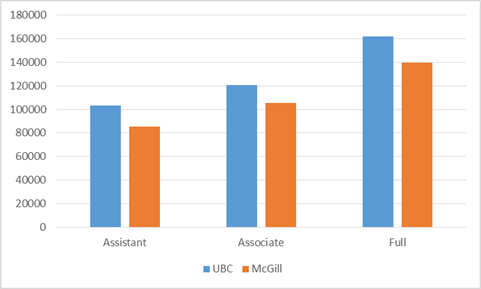In eastern parts of the country, if you use the words “the three best universities in Canada”, they look at you slightly oddly. They know you mean U of T and McGill, but they’re not 100% sure who the third one is. “UBC?” they ask, uncertainly. This is pure eastern myopia. Today, I will advance the proposition that by most measures, UBC is substantially ahead of McGill, and is in fact the country’s #2 university.
Let’s start with some statistics on size, just to orient ourselves. UBC is the slightly bigger institution, and at both institutions graduate students account for about 26% of all FTEs.
Enrolment and Academic Staff Complement, UBC vs. McGill
Now let’s look at money. The two institutions have similar-sized endowments, a shade over $1.3 Billion, which is a point in McGill’s favour when adjusted for student body size. When it comes to operating budget, however, there is simply no comparison: UBC’s has a total budget of $2.2 billion, and an operating budget of $1.1 billion; the equivalent for McGill is $1.4 billion and $620 million. On an unadjusted basis, UBC takes in $58,500 per FTE student, to McGill’s $40,493 – a 44% gap in UBC’s favour. If we adjust for student body composition – that is, convert all FTE’s into Weighted FTEs based on field of study, and use the weights used by the Quebec government (see here for more details) – then the gap actually increases somewhat to 48%. Point UBC.
Figure 1: Total Income per Student and per Weighted Student Unit, 2011-12, UBC vs. McGill
Now let’s look at some measures of research output, like bibliometrics. This data is taken from the 2013-14 Leiden rankings, which is the most comprehensive publicly available list of bibliometric indicators. On sheer volume of publications UBC wins, which probably isn’t surprising given its size. But on measures of publication impact – normalized citation scores, and the percentage of papers among the 10% most-cited in its field in the past five years – UBC is ahead in both, as it is in the percentage of papers that involved collaboration with an industry. Only in the category of papers with international collaborators does McGill come out on top. Point UBC.
World Position in Leiden Rankings on Selected Bibliometric Indicators, UBC vs. McGill (Leiden Rankings, 2014-15)
While we’re at the research output game, we might as well see what the “Big Three” (Shanghai ARWU, Times Higher, and QS) international rankings say, all of which are mostly based either on research or prestige (as measured by surveys of academics). Two of the three say: point UBC
Positions in Major International Rankings, 2014/15, UBC vs. McGill
Does faculty pay matter? Here’s the most recent average pay data from the three institutions. UBC wins again, by about 20% at the level of assistant profs, and 15% above that. Still: point UBC.
Figure 2: Average academic staff pay by rank, UBC vs. McGill
Now this is from the Statistics Canada, Full-time University and College Academic Staff Survey, 2009-10. And yes, that’s old, but it’s the last year for which we have data from both institutions because Statscan discontinued the survey, and as far as I know, the COU-led replacement survey hasn’t reported anything publicly yet. And given both institutions’ limits on salary increases the last few years, I doubt the gap has changed much.
And of course, there’s student experience. Here are the two universities compared on the main aspects of student satisfaction, using data from the final Canadian University Report. These are scored on a 9-point scale. Point: McGill.
Select Measures of Student Satisfaction, Canada
In other words, UBC comes ahead on most measures. And when you think about it, this isn’t all that surprising. It has far more money than McGill, it has huge endowment lands, which represent a huge future income, and it is far better positioned to take advantage of the rise of Asia. Arguably, given the imbalance in resources, the question is: why isn’t UBC even further ahead of McGill than it actually is? (Or, to reverse that: well done to McGill for being so efficient!)
To conclude: UBC is fairly clearly ahead of McGill – the question now is when will it overtake U of T?







 Tweet this post
Tweet this post

But think of EricAndIlsa, the ill-starred pair, one working at UBC with 5 children in Vancouver who can’t survive on $250,000 according to their infamous profile in the Globe and Mail Financial Facelift series.
https://twitter.com/ericandilsa
http://www.cbc.ca/news/canada/british-columbia/eric-and-ilsa-globe-and-mail-rich-couple-s-financial-woes-not-uncommon-says-expert-1.2926644
I just finished reading an academic history of Basel in the nineteenth century. The top-ranked universities in the German-speaking world at the time were Heidelberg and Berlin, but it was Basel that gave us Franz Overbeck, Jakob Burckhardt and Friedrich Nietzsche.
Cool – what;s the book?
_Basel in the Age of Burckhardt_ by Lionel Gossman.